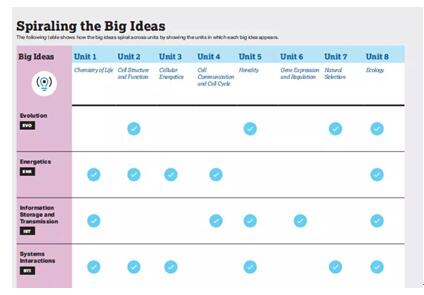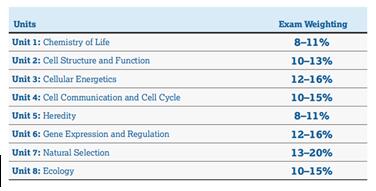
AP生物考什么?AP生物共包括四个大方向的BIG IDEA--
BIG IDEA 1: EVOLUTION (EVO)
The process of evolution drives the diversity and unity of life. Evolution is a change in the genetic makeup of a population over time, with natural selection as its major driving mechanism.
进化过程推动了生物的多样性和统一性。进化过程是指一个随时间种群中的基因组成发生变化,而自然选择是其主要驱动机制。
BIG IDEA 2: ENERGETICS (ENE) Biological systems use energy and molecular building blocks to grow, reproduce, and maintain dynamic homeostasis. Cells and organisms must exchange matter with the environment. Organisms respond to changes in their environment at the molecular, cellular, physiological, and behavioral levels.
生物系统运用能量和分子基本单位来生长、繁殖以及维持动态的平衡。细胞和有机体必须和环境交换物质。有机体在分子水平,细胞水平,机体水平以及行为水平对其生长环境的改变作出应对。
BIG IDEA 3: INFORMATION STORAGE AND TRANSMISSION (IST)
Living systems store, retrieve, transmit, and respond to information essential to life processes. Genetic information provides for continuity of life, and, in most cases, this information is passed from parent to offspring via DNA.
生物系统存储、提取、传递生命活动的基本信息,并对其作出相应的反应。基因的遗传信息为生命的延续提供基础,并且大部分情况下这个遗传信息是以DNA的方式从亲代传递到子代。
BIG IDEA 4: SYSTEMS INTERACTIONS (SYI)
Biological systems interact, and these systems and their interactions exhibit complex properties.
生物系统相互作用,这些系统以及它们之间的互动成就了复杂的特性。
而这四个大方向的big idea是贯穿AP生物内容的一些核心思想以及一个整体框架,也就覆盖了AP生物各个章节的内容,各big idea中所包含的章节知识如下:

AP生物包含8个Unit,每个Unit所占的考试比重如下:

上一篇: AP生物考试题型介绍
下一篇: AP美国历史主要学习内容整理

